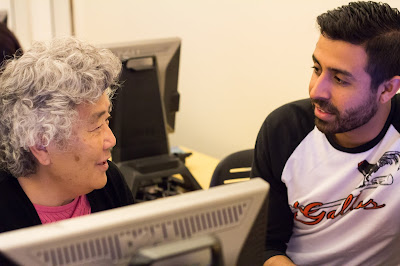It’s National Nonprofit Day! To mark the occasion, we’re excited to have a post from Jeff Hilimire, founder of 48in48, one of our nonprofit partners dedicated to helping other nonprofits make the most of their online presence. Jeff is also CEO of Atlanta-based Dragon Army.
“How do I find a way for my team members to use their skills in digital marketing to help nonprofits in Atlanta?”
That was the question I kept asking myself as my first digital agency, Spunlogic, grew to almost 100 employees in the mid-2000s. In those days, we would volunteer every quarter at local nonprofits like soup kitchens, homeless shelters, and food drives — but we weren’t giving back with our greatest strengths, our digital skills, which allowed us to help our paying clients build brands and connect with their customers.
I wrestled with this question for almost a decade, understanding that in today’s landscape the ability for a nonprofit to connect with donors, volunteers, and team members through digital channels would be paramount to their success.
Then it hit me:“What if I put on a hackathon that brought together 150 volunteers to build as many nonprofit websites as possible in a single weekend?”
The idea for 48in48 was born. In 2015, I asked my good friend, Adam Walker, to co-found this new organization with me and we hosted our first event later that year in Atlanta. The idea was to build 48 new websites in 48 hours, pairing great digital talent with nonprofits doing essential work in our communities. That event was so well received that we decided to host a spring event in New York, followed by our second Atlanta event later in the fall of 2016. When both of those events went exceptionally well, we knew we were on to something.
In 2017, we hosted events in Atlanta, New York, Boston, and Minneapolis. And then in 2018, we put on events in six cities: Atlanta, New York, Boston, Chapel Hill (NC), Bloomington (IL), and our first international event in London!
Today, we’ve organized 14 events, helped more than 650 nonprofits, and registered 2,000+ volunteers — and we’re just getting started!
We haven’t done this alone. Google Fiber has been a sponsor since our first year, and we’ve worked with them in a number of capacities. From serving on our board to bringing their talents to help our nonprofit clients optimize their online presence, our relationship with Google Fiber has allowed us to increase our impact. We’ve used key partnerships like this with other brands too, like Delta Air Lines and State Farm, to help us continue to scale. Without their support, we wouldn’t have been able to dream so big.
"We had a record number of users come to our application this year, which we credit to the ease of access and information on our website. Our online presence finally matches who we are as an organization – forward thinking, efficient, sharp, and in constant pursuit of
excellence. This shift moves us onto a new level for how we talk to the public, and our donors love it! We owe so much of that to the team at 48in48 for giving us an incredible website template,” said Jeannette Rankin, founder of the Women’s Scholarship Fund.
Our goal is to create a service opportunity where 10,000 marketing and technology volunteers can donate their skills for good on an annual basis. We’d love your help in this mission! Find out how you can get involved today at 48in48.org.
 | |
|
~~~
author.name: Jeff Hilimire
author.title: Founder, 48in48, and CEO, Dragon Army
category: community_impact



